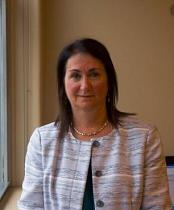Israeli doctor fights for patients at Canada’s only women’s holistic HIV clinic
VANCOUVER — As medical director of Canada’s only multidisciplinary clinic for women and children with HIV, Dr. Neora Pick finds this time of year emotionally charged. December 1 is World AIDS Day, which commemorates the millions who have died from the disease and highlights the fight against the HIV virus behind AIDS. After nearly 15 years at the Oak Tree Clinic in Vancouver, on the front lines of treating those with the potentially deadly infection, the Israeli-raised Pick knows only too well the tragedy and triumph involving the pandemic.
“Especially on World AIDS Day, I think about all the people who’ve died from the disease before there was treatment that could have saved them,” Pick told The Times of Israel during a recent interview at the clinic. “I also think about the huge progress made where we now provide one tablet a day for newly diagnosed people to give them normal lives, and yet, sadly, the stigma of HIV still persists.”
Pick began her career in internal medicine and infectious diseases in Israel. She is deeply committed to her work at the clinic, located at the British Columbia Women’s Hospital (BCWH), close to the largest Jewish day school in western Canada.
AIDS, which attacks a person’s immune system, has exacted a heavy toll since first identified in 1981. According to the World Health Organization (WHO), it has killed 32 million people. In 2018, nearly 800,000 people died of HIV-related illnesses worldwide while 1.7 million others became newly infected with the virus. At the end of last year, 38 million people were living with HIV, its severity varying considerably between countries; sixty-nine percent of global HIV cases (25.7 million) are found on the African continent, says the WHO.
In Canada, HIV is a serious concern, even if the situation is far less dire than in Africa. According to government figures, 63,000 Canadians had HIV at the end of 2016, an increase of 5% in two years. Fifty-three percent of new HIV infections were transmitted through male-to-male sex, 33% from heterosexual contact, and 11% from injection drug use. About a quarter of HIV-positive people were women.



